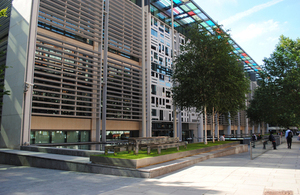Government plan to fight corruption unveiled
A wide-ranging and ambitious programme to boost the UK’s ability to tackle corruption at home and abroad was announced by the government today.

Home Office
The UK Anti-Corruption Plan, which has over sixty actions for government and partners, will set the strategic direction for all anti-corruption activity over the coming year and ensure greater collaboration and consistency across the public and private sectors.
The plan, which paints a comprehensive picture of the threat to the UK from corruption, will highlight ways in which safeguards are being reinforced within key sectors and institutions, including the criminal justice system and associated professions.
And by enhancing the response of law enforcement agencies, it will ensure individuals involved in bribery and corruption, or those who hide their illicit assets in the UK, are relentlessly pursued and brought to justice.
Building on the Prime Minister’s commitments at the G8 Lough Erne Summit last year, the plan also sets out how the government is doing more to increase transparency, tackle money-laundering and ensure that the UK is at the forefront of efforts to raise international standards.
Its delivery will be overseen and reviewed by an Inter Ministerial Group chaired by Matthew Hancock, Minister for Business, Enterprise and Energy and the government’s Anti-Corruption Champion, and Karen Bradley, Minister for Modern Slavery and Organised Crime.
Matthew Hancock said:
All the studies show that corruption is a grave threat to our economic prosperity and national security.
As host to one of the world’s largest financial centres, the UK has a moral duty and global responsibility to ensure that corrupt officials and organised criminals do not abuse our systems. We are one of the least corrupt nations on earth, but we want to do more.
This new plan will make sure that we spearhead the international fight against corruption. Together with our international partners, we will push for robust action against corruption at every possible opportunity.
Karen Bradley said:
The UK has far lower levels of corruption and bribery than most other countries around the world but we cannot be complacent. Its impact is hugely disproportionate to the level and frequency at which it occurs and can have a serious impact on public confidence in our institutions.
Our comprehensive UK Anti-Corruption Plan, which goes hand in hand with our Serious and Organised Crime Strategy, will bring greater coordination and coherence to existing activity and set a clear course for the future work of government and law enforcement agencies.
Under the plan, which has been developed as part of the second Open Government Partnership National Action Plan:
-
the National Crime Agency will establish a specialist unit, including a multi-agency intelligence team, to tackle bribery and corruption head on
-
the Home Office will establish a new offence of police corruption and recently launched a consultation on measures to better protect police whistleblowers
-
the Treasury and Home Office will complete a national risk assessment on money laundering and terrorist financing, and address any issues it highlights through an Anti-Money Laundering Action Plan
-
the Department for International Development will develop plans to launch an international rapid response team to provide expert assistance on mutual legal assistance and asset recovery to countries undergoing regime change
-
the Cabinet Office will work with civil society groups to improve transparency and open data to reduce opportunities for corruption
-
the Foreign & Commonwealth Office will develop a toolkit of interventions for tackling international corruption cases and to raise global standards.
The UK is ranked as one of the least corrupt of the 170 countries listed on Transparency International’s most recent annual ‘Corruption Perceptions Index’
The government has taken a number of steps in recent years to tackle corruption and there are good structures and legislation, such as the Bribery Act, in place. It has also published the Serious and Organised Crime Strategy and established the National Crime Agency to enhance the nationwide response to serious crimes including bribery and corruption.
The plan highlights that the government’s priorities are:
- to build a better picture of how corruption is affecting our society and economy
- to strengthen our legal and operational tools and activity
- enhance our law enforcement response
- deny use of our financial system for those who are trying to abuse it
- step up our efforts internationally